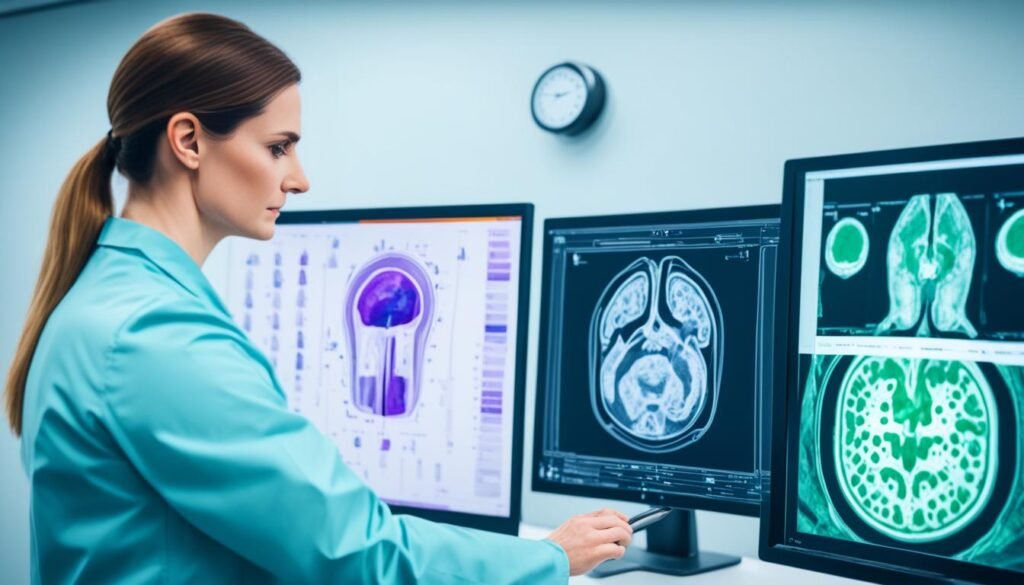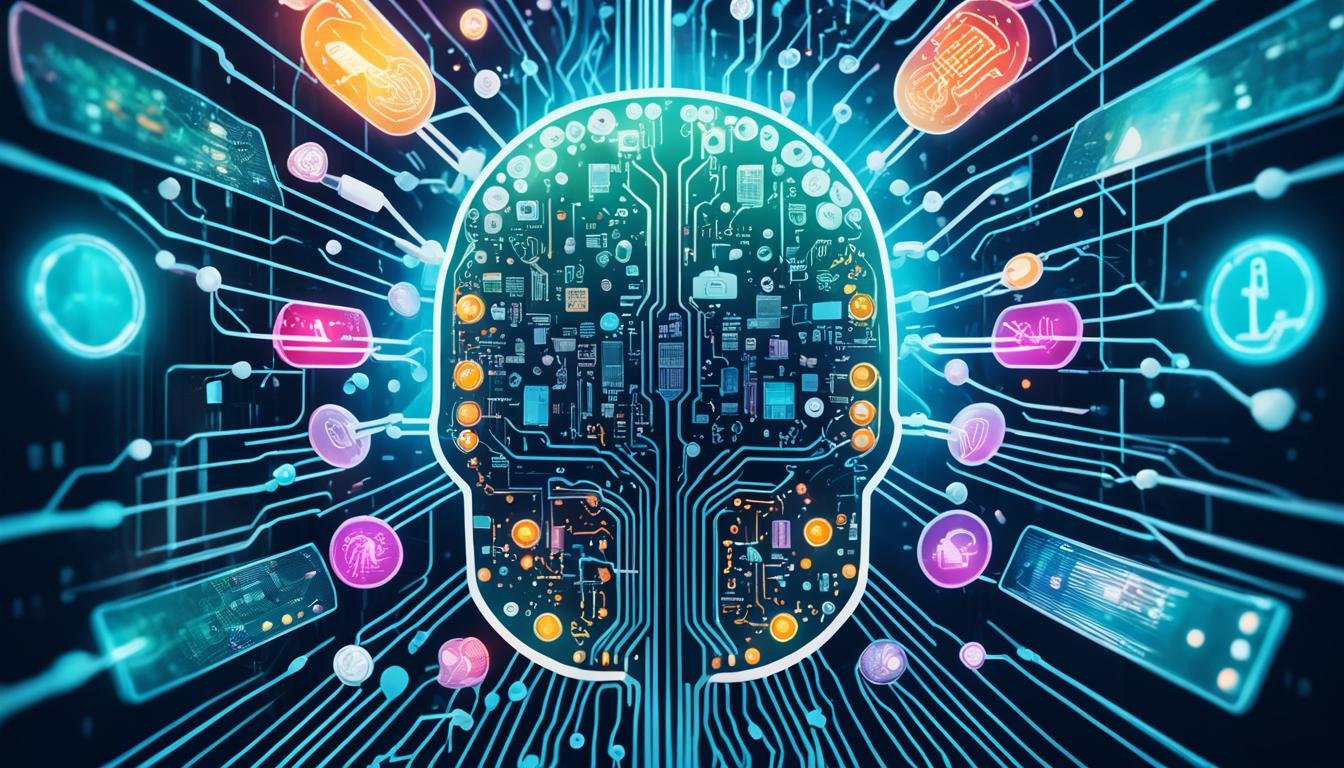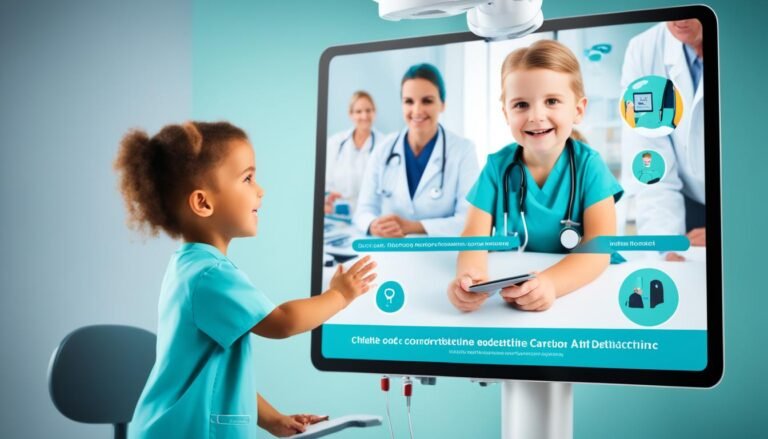Synthetic Data’s Role in Medical AI Development
Did you know that the healthcare industry generates an estimated 2.5 quintillion bytes of data every day? With such a vast amount of information being generated, the potential for leveraging artificial intelligence (AI) in medicine and healthcare is immense.
The application of machine learning in healthcare has already shown promising results, with AI being used for diagnosis and treatment recommendations, patient engagement, and administrative activities. However, one of the key challenges in developing AI models for healthcare is the limited access to real-world patient data, which raises concerns around privacy and data security.
Key Takeaways:
- Synthetic data generation offers a solution to the challenges of limited access to real-world patient data.
- By generating artificial patient data that closely resembles real data, synthetic data enables the development of AI models without compromising patient privacy.
- However, there are limitations related to data leakage, generating diverse patient cohorts, and addressing bias that need to be overcome for synthetic data to be effectively utilized in healthcare.
- As AI and machine learning continue to advance, interdisciplinary collaboration and ethical considerations are essential to ensure responsible and equitable use of AI in medicine.
- Integrating synthetic data with real-world patient data has the potential to revolutionize medical research, improve patient outcomes, and advance the field of healthcare.
The Advantages of Synthetic Data in Healthcare
Synthetic data generation has become a valuable solution in the field of healthcare, addressing the challenges of limited access to real-world patient data. Synthetic data refers to artificially created data that closely resembles real patient data but does not contain any personally identifiable information. This innovative approach offers numerous advantages in the healthcare domain, including:
1. Believable Patient Data Across Various Modalities
Synthetic data generation enables the creation of realistic patient data in different modalities such as structured electronic health record (EHR) data, clinical notes and reports, and medical images. This allows healthcare professionals to explore and test various scenarios utilizing data that accurately represents real-world patient experiences. By providing diverse and comprehensive synthetic data, healthcare organizations can improve decision-making, develop and validate algorithms, and enhance patient care.
2. Privacy and Compliance Assurance
An essential benefit of synthetic data is the absence of privacy and compliance concerns. As no real patient data is used in the generation process, synthetic data eliminates the risks associated with handling sensitive information. This ensures compliance with data protection regulations while allowing researchers and developers to work with realistic healthcare data effectively.
3. Effective Demonstration and Training
Synthetic data is particularly useful for demonstrating healthcare software user interfaces, training medical professionals, and facilitating system understanding. By providing simulated patient data, synthetic data allows users to explore and familiarize themselves with various healthcare systems and workflows. This enhances training programs and promotes a better understanding of medical processes without the need for real patient data.
4. Overcoming Data Limitations
In healthcare, the scarcity and limited accessibility of real-world patient data hinder the development of robust AI models. Synthetic data generation serves as a valuable tool to augment existing datasets and address data limitations. By generating synthetic patient data, healthcare researchers and developers can expand their data sources and enable the creation of more reliable and accurate AI models.
Although synthetic data offers these significant advantages, it currently has limitations related to data leakage, generating diverse patient cohorts, and potential bias. These challenges need to be addressed to fully leverage the potential of synthetic data in healthcare.
| Advantages of Synthetic Data in Healthcare |
|---|
| Believable Patient Data Across Various Modalities |
| Privacy and Compliance Assurance |
| Effective Demonstration and Training |
| Overcoming Data Limitations |
Data Leakage in Synthetic Data
Data leakage is a significant concern in the development and use of synthetic data for machine learning in medicine and healthcare. It occurs when information from the test dataset unintentionally influences the training process, leading to an inaccurate evaluation of the model’s performance. In the context of synthetic data, one of the common issues is that it tends to be “too clean” compared to real-world patient data.
Synthetic data generation aims to create data that closely resembles real patient data without containing any personally identifiable information. However, this lack of noise and variability present in real-world data can lead models trained on synthetic data to achieve artificially high performance. For instance, these models may achieve accuracy scores close to 100%, while real-world data typically yields lower scores.
The discrepancy between synthetic and real-world data can hinder the development of accurate and reliable healthcare AI models. When the noise and variability present in real patient data are absent in synthetic data, the models may not adequately generalize to real-world situations. This can give a false sense of the model’s effectiveness and limit its ability to perform well in practical healthcare scenarios.
Addressing data leakage in synthetic data is crucial to ensure the development of robust and reliable healthcare AI models. Researchers and developers must focus on creating synthetic data that incorporates the inherent noise and variability seen in real-world patient data. By doing so, they can improve the generalizability of AI models and better understand their performance in real healthcare settings.
“Addressing data leakage in synthetic data is crucial to ensure the development of robust and reliable healthcare AI models.”
Overall, data leakage in synthetic data poses a challenge in accurately evaluating the performance of AI models in healthcare. It highlights the importance of considering the nuances and complexities present in real-world patient data when developing and utilizing synthetic data for training and research purposes.
Generating Diverse Patient Cohorts with Synthetic Data
In order to develop accurate AI models and conduct meaningful analyses in healthcare, it is crucial to have a large and diverse patient population. Synthetic data generation has the potential to scale and generate a significant number of patients. However, one of the challenges it faces is generating a coherent cohort that accurately represents the diversity and distribution of real-world patient populations.
Healthcare variables are highly correlated, making it difficult for current generative algorithms to produce synthetic patients that are distinct and diverse compared to each other. As a result, the lack of diversity in synthetic patient cohorts can have a negative impact on the performance and generalizability of AI models when applied to real-world patient populations.
To overcome this limitation, ongoing research and advancements in synthetic data generation tools are necessary. Improved generative algorithms can ensure the creation of synthetic patient cohorts that better capture the heterogeneity and complexity of real-world patients. By addressing the challenge of generating diverse patient cohorts, the reliability and effectiveness of AI models in healthcare can be significantly enhanced.
Benefits of Generating Diverse Patient Cohorts
Generating diverse patient cohorts with synthetic data offers several advantages for medical AI development and research:
- Improved model performance: Diverse patient cohorts can help AI models better capture the complexities and variabilities present in real-world patient populations, leading to more accurate and reliable predictions.
- Enhanced generalizability: By incorporating diverse patient cohorts, AI models have a higher likelihood of performing well on a broader range of patients, contributing to better healthcare outcomes.
- Robust analysis and insights: Diverse patient cohorts enable researchers and analysts to conduct more comprehensive and meaningful analyses, uncovering insights that may have been missed with limited or homogeneous data.
It is important to continue researching and developing new techniques for generating diverse patient cohorts with synthetic data. Through advancements in data augmentation techniques and the incorporation of a wide range of patient attributes and characteristics, AI models can become more inclusive and effective in addressing the diverse needs of patients across different demographics and medical conditions.
“Diverse patient cohorts are essential for the accurate and reliable development of AI models in healthcare. By overcoming the challenge of generating diverse synthetic patient data, we can unlock the full potential of medical AI and improve patient care.” – Dr. Rebecca Johnson, Chief Medical Officer at MedTech Solutions
Addressing Bias in Synthetic Data
Biases in healthcare data are a well-documented issue, with certain demographic groups being underrepresented or excluded from clinical trials and medical research. Since generative algorithms are trained on existing data, any biases present in the source data will be reflected in the generated synthetic data. For example, if a synthetic data generator is trained on predominantly white medical records, it may not accurately reflect the disease progression and outcomes experienced by Black patients. This can perpetuate and exacerbate existing healthcare disparities. To obtain accurate results for different demographic groups, representative real-world data should be collected and used in the training process to minimize bias in synthetic data generation.
| Bias Types | Causes | Impact | Solutions |
|---|---|---|---|
| 1. Representation Bias | – Underrepresentation of certain demographic groups in source data – Lack of diversity in data collection processes |
– Inaccurate predictions for underrepresented groups – Reinforcement of existing healthcare disparities |
– Collect diverse and representative real-world data for training – Ensure appropriate data collection strategies |
| 2. Sampling Bias | – Unequal distribution of samples from different populations – Non-random selection of data for training |
– Distorted generalization of AI models across populations – Unfair treatment and decision-making for certain groups |
– Implement balanced sampling techniques during data selection – Consider stratified and random sampling methods |
| 3. Label Bias | – Misclassifications or inaccurate labeling of data points – Subjective interpretations of medical conditions |
– Biased predictions and classifications by AI models – Inequitable diagnosis and treatment recommendations |
– Improve labeling accuracy through expert annotation – Implement strict quality control measures |
Key Considerations
- Recognize and acknowledge existing biases in healthcare data
- Ensure diverse and representative real-world data for training
- Implement unbiased data collection and sampling strategies
- Regularly assess and validate AI models for bias detection
- Promote interdisciplinary collaboration to address bias in synthetic data
By addressing bias in synthetic data generation, we can help promote fairness, equity, and accuracy in healthcare AI development, fostering a more inclusive and effective approach to medical research and patient care.
Applications of Artificial Intelligence in Healthcare
Artificial intelligence (AI) has revolutionized the healthcare industry, transforming the way patient diagnosis, prognosis, and personalized treatment options are approached. With the advancements in AI technology, healthcare professionals now have access to powerful systems that assist in various clinical tasks and decision-making processes.
One of the significant applications of AI in healthcare is in the field of diagnostics. AI systems have been developed to diagnose skin cancer with a high level of accuracy, rivaling that of dermatologists. These systems utilize sophisticated algorithms and machine learning techniques to analyze images of skin lesions and provide accurate diagnoses, aiding in early detection and improving patient outcomes.
AI is also making strides in image classification and analysis, particularly in retinal imaging. With the use of deep learning algorithms, AI systems can classify retinal images and detect eye diseases such as diabetic retinopathy and macular degeneration. This technology allows for early detection and timely treatment, preventing complications and vision loss.
Furthermore, AI is optimizing healthcare workflows and improving patient care and communication. Companies like AiCure, Aidence, and Babylon Health are leveraging AI technologies to enhance different aspects of healthcare, such as medication adherence, telemedicine, and patient engagement. These AI-powered platforms and applications assist healthcare professionals in streamlining their workflow, providing personalized care, and improving patient satisfaction.
“Artificial intelligence has the potential to revolutionize patient care, improve efficiency, and advance medical research and development.” – [Synthetic Data in Machine Learning for Medicine and Healthcare]
Another area where AI is making a significant impact is in drug discovery and development. With the ability to analyze vast amounts of data and identify patterns, AI systems can expedite the discovery of new drugs and predict their efficacy and safety. This technology holds immense potential for accelerating the development of life-saving medications and improving patient outcomes.
Example AI applications in healthcare:
- AI-enabled robotic surgery systems that enhance precision and minimize invasiveness
- Virtual nursing assistants that provide real-time support and guidance to patients
- Natural language processing algorithms that extract valuable insights from unstructured clinical notes
- AI chatbots that assist patients in navigating healthcare resources and providing information
- AI-powered predictive analytics tools that aid in population health management
The use of AI in healthcare is transforming the industry, leading to improved patient outcomes, increased efficiency, and advancements in medical research and development. As AI technology continues to evolve, its applications in the healthcare sector will grow, ushering in a new era of innovation and improved healthcare delivery.

Artificial Intelligence and the Medical Sciences
Artificial intelligence (AI) has achieved remarkable progress in the field of medical sciences, revolutionizing various aspects of healthcare. AI applications have proven to be invaluable in diagnosing patients, identifying suitable treatment options, advancing drug discovery, improving communication between physicians and patients, and even transcribing medical documents.
One notable accomplishment of AI systems is their ability to achieve accuracies comparable to human experts in different medical domains. For instance, deep convolutional neural networks trained with machine learning techniques have exhibited performance on par with dermatologists and ophthalmologists in classifying skin cancers and retinal images, respectively.
AI’s prowess in medical science is transforming the way diseases and conditions are diagnosed, enabling earlier detections and more accurate predictions. Its ability to analyze vast amounts of medical data assists healthcare professionals in making informed decisions, leading to improved patient outcomes and more personalized treatment approaches.
Furthermore, AI is contributing significantly to the field of drug discovery. By leveraging machine learning algorithms to analyze genomic data, AI systems can identify potential treatments and accelerate the development of new drugs. This not only saves time and resources but also brings hope for more effective therapies for various diseases.
AI’s impact on communication within the healthcare ecosystem is substantial. AI-powered chatbots and virtual assistants facilitate efficient and seamless interactions between physicians and patients, enhancing patient experience and engagement. By providing accurate and timely information, these virtual assistants help address patient queries and concerns, improving overall healthcare interactions.
The application of AI in medical document transcription has also been highly beneficial. AI systems can accurately transcribe medical notes, allowing healthcare professionals to focus more on patient care rather than administrative tasks. This streamlines workflows and enhances the efficiency of healthcare providers, ultimately resulting in improved patient care.
With its potential to improve patient outcomes, accelerate research, and expand access to healthcare services, AI is revolutionizing the landscape of medical science. As the field continues to advance, the integration of AI technologies will play a vital role in shaping the future of healthcare.
The Potential of AI in Medical Science
AI has the potential to:
- Enhance diagnostic accuracy and early disease detection.
- Personalize treatment plans based on individual patient characteristics.
- Facilitate drug discovery and accelerate the development of new therapies.
- Improve communication between healthcare professionals and patients.
- Optimize healthcare workflows and administrative tasks.
| Advantages of AI in the Medical Sciences | AI Applications in the Medical Sciences |
|---|---|
| Improved diagnostic accuracy | Diagnosis of skin cancers |
| Personalized treatment options | Classification of retinal images |
| Accelerated drug discovery | Efficient healthcare workflows |
| Enhanced communication between physicians and patients | Transcription of medical documents |
As AI technologies continue to evolve, they hold promise for driving further advancements in medical science. However, ethical considerations, privacy concerns, and the need for responsible AI implementation remain crucial factors to ensure the safe and equitable integration of AI in healthcare.
The Impact of Artificial Intelligence in Medical Science
Artificial intelligence (AI) is revolutionizing medical science, transforming various aspects of patient care, treatment, and research. By leveraging advanced algorithms and data processing capabilities, AI systems have the potential to significantly enhance healthcare outcomes and alleviate the burden on healthcare professionals.
AI in medical science enables the processing and analysis of vast amounts of medical data, leading to faster and more accurate diagnoses of diseases. Machine learning algorithms can recognize patterns and trends in patient data, supporting physicians in making more informed decisions and providing personalized treatment options.
One of the areas where AI shows great promise is in drug discovery. By analyzing genomic data and identifying potential treatments, AI algorithms can assist researchers in finding new medications or repurposing existing ones. This can accelerate the development of effective therapies and improve patient outcomes.
The integration of AI-powered chatbots and virtual assistants in healthcare settings enhances communication between physicians and patients. These interactive tools can provide patients with vital information, answer basic medical questions, and offer support for self-care. By improving patient engagement and satisfaction, AI-driven technologies contribute to a more positive healthcare experience.
“AI in medical science has the potential to revolutionize healthcare delivery, improve patient outcomes, and alleviate the burden on healthcare professionals.”
Advancements in Medical Research
Furthermore, AI is driving advancements in medical research by enabling the analysis of vast datasets and identifying trends that may go unnoticed by human researchers. AI algorithms can sift through clinical records, scientific papers, and genetic data to uncover patterns, contributing to the development of new therapies and medical breakthroughs.
Enhanced Diagnostics and Prognostics
AI systems are increasingly being used for diagnosing diseases and predicting patient outcomes. Image recognition algorithms can accurately detect abnormalities and lesions in medical images, such as X-rays and MRIs, enabling earlier detection and more targeted treatment plans. In addition, predictive models based on AI algorithms can assess patient data and provide prognostic insights, helping healthcare professionals anticipate disease progression and tailor personalized treatment strategies.
The Future of AI in Medical Science
The increasing adoption of AI in medical science holds immense potential for improving healthcare outcomes and advancing medical research. However, ethical considerations and data privacy concerns must be closely addressed to ensure responsible and equitable use of AI in medicine.
As AI technologies continue to evolve, interdisciplinary collaboration between healthcare professionals, data scientists, and policymakers is key to harnessing the full potential of AI in medical science. With proper regulation and responsible implementation, AI has the power to transform patient care, drive innovation, and revolutionize the field of healthcare.
Ethical Considerations in Medical AI Development
The rapid advancement of AI in healthcare brings forth a range of ethical considerations that need to be carefully addressed. These considerations are essential to ensure the responsible and equitable use of AI in medicine.
Patient Data Privacy and Security
One of the key concerns in medical AI development is healthcare data privacy and security. AI systems rely on large amounts of patient data to operate effectively. Therefore, it is crucial to prioritize data protection and compliance with privacy regulations to safeguard patient information.
Bias in Healthcare AI
Bias in healthcare AI is another critical concern. Biased training data can lead to biased predictions, perpetuating healthcare disparities. It is crucial to address and mitigate bias in AI algorithms and datasets to ensure fair and equitable healthcare outcomes for all patient populations.
Impact on Healthcare Professionals and Job Displacement
The impact of AI on healthcare professionals is an area that requires careful evaluation. While AI has the potential to augment healthcare tasks and improve patient care, it may also lead to job displacement in certain areas. It is important to assess the implications on healthcare professionals and ensure appropriate measures are in place to support any required transitions.
Ethical guidelines and regulations play a vital role in governing the development and deployment of AI in medicine. They serve as a framework for AI developers, researchers, and healthcare providers to follow, ensuring ethical standards are met and the potential risks associated with AI implementation are minimized.
A responsible and ethical approach to medical AI development, accompanied by robust privacy measures and bias mitigation strategies, will pave the way for advancements that prioritize patient welfare and societal well-being.
The Future of Synthetic Data in Medical AI
While synthetic data generation currently has limitations that prevent its use for training healthcare AI models, ongoing research and advancements in AI technology hold promise for overcoming these limitations. Future developments in generative algorithms and synthetic data generation tools may allow for the creation of more diverse and representative patient cohorts. Addressing data leakage and bias in synthetic data will also be crucial to ensure the accuracy and reliability of AI models in healthcare. As AI and machine learning continue to advance, it is important to explore the potential of synthetic data as a valuable resource for medical AI development.
One of the key advantages of synthetic data in medical AI is its ability to generate believable patient data in different modalities, such as structured electronic health record (EHR) data, clinical notes and reports, and medical images, without compromising privacy and compliance. By simulating realistic patient data, synthetic data can be used for a variety of applications, including demonstrating healthcare software user interfaces and developing AI algorithms for medical image analysis. However, the current limitations of synthetic data generation prevent its use for analytics, data science, or training medical machine learning models, as it may lack the inherent noise and variability present in real-world patient data.
Advancements in Generative Algorithms
Developments in generative algorithms are essential to improving the effectiveness of synthetic data generation in medical AI. These algorithms form the backbone of synthetic data generation tools and play a crucial role in creating patient cohorts that accurately represent the diversity and distribution of real-world patient populations. By enhancing the algorithms’ ability to generate realistic variations in patient data, researchers can achieve more accurate and reliable AI models for healthcare applications. The continuous improvement of generative algorithms is crucial in unlocking the full potential of synthetic data in medical AI.
Addressing Data Leakage and Bias
Data leakage and bias are significant challenges in synthetic data generation for medical AI. Data leakage occurs when information from the test dataset is inadvertently used during the training process, leading to an overestimation of the model’s performance. To ensure the accuracy and reliability of AI models, it is crucial to develop techniques that prevent data leakage in synthetic data generation. Additionally, addressing bias in synthetic data is crucial to avoid perpetuating disparities and ensuring fair and unbiased healthcare AI models. By incorporating diverse and representative real-world data, researchers can minimize bias and improve the overall quality of synthetic data.
Exploring the Potential of Synthetic Data
As AI and machine learning technologies continue to advance, there is a vast potential for synthetic data to contribute to medical AI development. By addressing the current limitations of synthetic data generation and leveraging advancements in generative algorithms, researchers can create more realistic and diverse patient cohorts. This, in turn, will enable the development of accurate and reliable AI models for various healthcare applications. Through interdisciplinary collaboration and continued research, the future of synthetic data in medical AI holds promise and has the potential to revolutionize the field of healthcare.
| Advantages | Challenges to Overcome | |
|---|---|---|
| Believable Patient Data | – Synthetic data closely resembles real patient data – Can be generated in different modalities |
– Lack of inherent noise and variability – Unsuitable for analytics and data science |
| Patient Cohort Representation | – Potential to generate diverse and representative cohorts | – Current struggle to accurately represent real-world patient diversity – Synthetic patients may be too similar to each other |
| Data Leakage Prevention | – Improved techniques for preventing data leakage | – Overestimation of model performance due to leaked test data |
| Bias Mitigation | – Addressing biases in synthetic data generation | – Reflecting biases present in the source data |
Conclusion
Synthetic data has the potential to revolutionize medical AI development by providing realistic and privacy-protected patient data for training and research purposes. The use of synthetic data in combination with real-world patient data can enhance medical research, improve patient outcomes, and advance the field of healthcare. However, there are current limitations that need to be addressed for synthetic data to be effectively utilized in healthcare.
Data leakage, where information from the test dataset is inadvertently used during training, can lead to overly optimistic evaluation of AI model performance. Generating diverse patient cohorts with synthetic data is another challenge, as current generative algorithms struggle to accurately represent the diversity and distribution of real-world patient populations. Additionally, bias in synthetic data generation can perpetuate existing healthcare disparities.
As AI continues to advance, interdisciplinary collaboration and ethical considerations are essential to ensure responsible and equitable use of AI in medicine. Researchers and practitioners need to work together to address the limitations of synthetic data and develop robust methodologies. By doing so, we can harness the power of synthetic data to advance medical AI development, while protecting patient privacy and ensuring the accuracy and reliability of AI models in healthcare.
FAQ
What is synthetic data generation?
Synthetic data generation is the process of creating artificial data that closely resembles real patient data but does not contain any personally identifiable information.
What are the advantages of synthetic data in healthcare?
Synthetic data allows for the generation of believable patient data in different modalities, such as structured electronic health record (EHR) data, clinical notes, and medical images. It also eliminates privacy and compliance issues since no real patient data is used.
What is data leakage in synthetic data?
Data leakage occurs when information from the test dataset is inadvertently used during the training process, leading to an overly optimistic evaluation of the model’s performance.
How does synthetic data struggle with generating diverse patient cohorts?
Synthetic data often produces patient cohorts that are too similar to each other compared to real-world data, resulting in a lack of diversity. This can affect the performance and generalizability of AI models trained on synthetic data.
How does synthetic data address bias in healthcare AI?
Synthetic data generation can reflect biases present in the source data. To minimize bias, it is important to collect and use representative real-world data in the training process.
What are the applications of artificial intelligence in healthcare?
Artificial intelligence is applied in various areas of healthcare, including diagnosis, treatment recommendations, patient engagement, administrative activities, and drug discovery.
How does artificial intelligence impact medical science?
Artificial intelligence enhances medical science by improving diagnosis accuracy, assisting in drug discovery, facilitating communication between physicians and patients, and optimizing healthcare workflows.
What are the ethical considerations in medical AI development?
Ethical considerations include patient data privacy and security, bias in healthcare AI, and the potential impact on healthcare professionals and job displacement.
What is the future of synthetic data in medical AI?
Ongoing advancements in AI technology and generative algorithms hold promise for addressing the limitations of synthetic data generation and making it a valuable resource for medical AI development.






